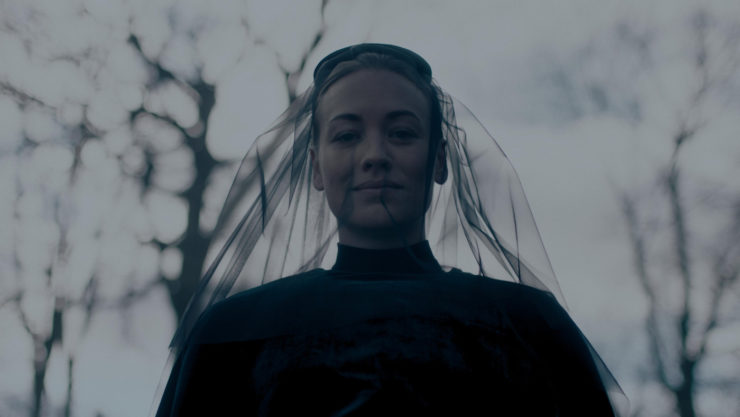With the confirmation that Hulu has renewed The Handmaid’s Tale for a sixth and final season, there’s a relief in finally hitting the home stretch. The last few seasons have tended toward the repetitive, making big swings back and forth between poles so often that each plot “twist” begins to lose its resonance: June (Elisabeth Moss) is leaving Gilead. No, she’s going back in for Hannah. No, she’s in Canada. Serena (Yvonne Strahovski) is leaving Fred. Wait, she’s back on his side, at least for appearances. Nope, it’s all part of her long game in finally cutting ties with Gilead and its Commander. Except that she’s pregnant. But now, lucky Serena, Fred is dead.
The same swing happens between the two women themselves, who constantly trade positions of power relative to one another. It’s a compelling dynamic, as they have loads of fraught history and are especially engaging to watch on the rare occasions that they work together, but something needs to actually change. If all we watch for the next two seasons is two white women play the game of who has the higher ground, The Handmaid’s Tale will fumble its own potential legacy.
Spoilers for the first two episodes of The Handmaid’s Tale season 5
It’s surprising to realize that the past season of The Handmaid’s Tale has covered only a few months (potentially even just weeks) of plot; Serena found out about her “miraculous” pregnancy in the season 4 premiere, and as of this season premiere she still has months of gestation left to go. When I reviewed last season’s finale “The Wilderness,” I had hoped for a time jump that would take us far enough into the future to see how the various children of Gilead—Serena’s unborn son; Agnes, a.k.a. Hannah; and Nichole, a.k.a. Holly—were following their fates on either side of the border.
But I’m not surprised that “Morning” picks up immediately where we left off; and the series does seem to be reckoning with the big question of what Gilead’s next act is, especially as concerns its youngest members. It’s just very slow in getting there, in favor of some more emotional swings for poor June, Luke, and Moira.
Bloody Hand(maid)s
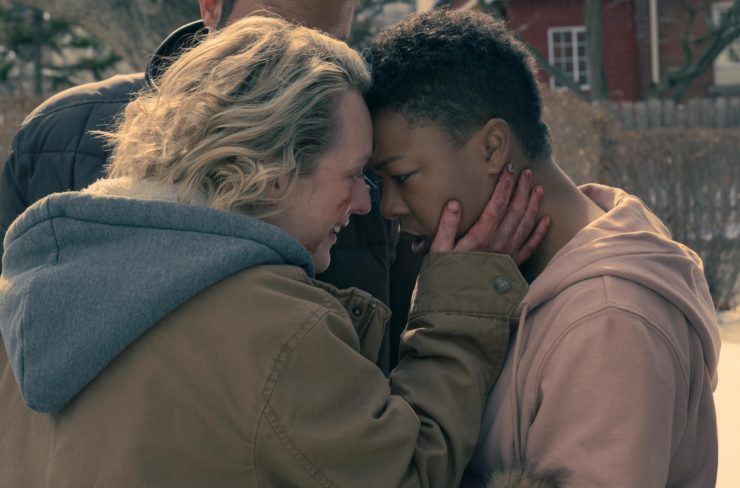
We find out that June’s return home after literally tearing Fred apart in the No Man’s Land Particicution was to give Nichole one last hug before giving herself over to some form of vigilante justice. First she goes to meet the other murderous Handmaids at a diner, in one of the series’ wickedly cheeky scenes juxtaposing the utterly banal before-times with the dystopian details. It’s almost a callback to that great season 2 scene where all the Handmaids are wistfully remembering brunch, only for Serena to awkwardly try to join in; except now it’s June chowing down on pancakes after biting off a mouthful of Fred’s flesh.
The thing is, June is way over her head here. She’s sparked a bloodlust among her fellow enslaved women, who all showed up for her personal vengeance against Fred, and now want the mob to turn its eye to someone’s Aunt, or another’s Wife. June’s palpable panic at things getting out of control is a welcome contrast to her strutting around like some celebrity rebel… but her telling a group of justifiably angry women of color that they can’t get their catharsis is not a good look, either.
Buy the Book


The Book Eaters
So she tries to make up for it by turning herself in and claiming sole responsibility for the murder of Fred Waterford. It is a darkly funny scene once it becomes clear that the Canadian government is willing to look away at something that happened not on their soil; June is stymied, having convinced herself that she was going to prison. The woman clearly wants someone to take the control away and make her atone, whether or not she deserves it, rather than continue to do a different kind of hard work in rebuilding her relationships with Nichole, Luke, and Moira.
Not Emily—she’s gone back into Gilead, i.e., they wrote Alexis Bledel off the show. Despite the writers having to work the story around an actor’s departure, it leads to an excellent scene between June and Emily’s wife Sylvia (Clea Duvall), who has the best perspective of anyone surviving these horrors: “Oliver and I are gonna be happy with the time we had with her. She was gone, and then she was here. It’s more time than I ever thought I would get. We’re lucky in a lot of ways.”
During that scene, in which Sylvia won’t even give June the self-flagellating satisfaction of hating her, it almost seems as if our eponymous former Handmaid is starting to understand the usefulness of moving on. But then she goes home, needles poor Rita (Amanda Brugel) until she’s too upset to enjoy game night, and forces Moira to give it to her straight—that June scares her. And at least June gets it, and is admitting that she scares herself. But she also can’t help herself; she keeps rattling on about Gilead even when no one wants to listen, because she can’t get past it. The scene between June and Moira in the kitchen in “Morning” is the best shot of the episode: the alternating straight-on shots giving the effect of staring into each other’s eyes, so that we witness from June’s perspective Moira’s look of what the fuck when June thinks aloud about how nobody would be looking for somebody going back into Gilead. “Who would do that?” she laughs nervously like it’s some big joke, but we already know the answer.
Gilead’s Next Generation

Actually in Gilead (mostly in the second episode, “Ballet”), we return to the mother/maiden/crone dynamic of Janine (Madeline Brewer), Esther (Mckenna Grace), and Aunt Lydia (Ann Dowd). Janine continues to play both sides, giving Lydia updates as to how she’s preparing Esther for her first Handmaid posting while offering (genuine!) empathy and guidance to the poor teenaged Wife-turned-womb. Esther wants to blow shit up from the inside, but Janine actually gets stern with her—a fascinating reversal from the season 4 premiere, when Esther forced her to eat meat at her farm while sheltering the runaway Handmaids. How the tables have turned.
But we cannot forget that Esther is just a child who has already been badly abused by the loopholes of Gilead’s system, and that she does not deserve the humbling she receives in this episode. It’s gratifying to see how rattled Naomi Putnam (Ever Carradine) looks when she realizes just how young her household’s potential new Handmaid is. No doubt it’s just now dawning on her what class her precious Angela might get shuffled into once her period comes. (An aside: It was really lovely to see Naomi acknowledge that Janine brought Angela into this world; it doesn’t make up for aaaany of what she suffered, but it’s a big step for a Wife to give a Handmaid credit for anything.)
And then—the scene with the chocolates. All this time we had hoped that Fred was an especially depraved example of a Commander drunk with power, with his illicit Scrabble games and visits to Jezebels; and that Commander Lawrence (Bradley Whitford), who refused to participate in the Ceremony, was less of an outlier. But Commander Putnam (Stephen Kunken) is just a creepy old man who can’t resist shoving a forbidden candy into the mouth of a girl. Ugh.
Again, you can’t really blame Esther for what she does after that. It’s rough that she took down Janine with her—and especially dark to use the girlish bonding over forbidden fruit chocolates—but Janine pushed Esther to go to the Putnams so she could hug her daughter. I’m also guessing that Janine will pull through, depending how quickly Lydia got to her.
My big question is, how will Gilead decide which of its girls become Wives and which become Handmaids? Gilead’s first generation of Handmaids were chosen because of their proven fertility, whether they conceived through surrogacy (Moira) or queer IVF/ART (Emily) or spontaneously (June and Janine). Clearly Gilead figures that they’ll start their girls young (presumably at their most fertile, despite being far too young to be mothers), but there’s no actual test for fertility beyond gauging their success at conceiving and carrying a pregnancy to term. What happens when girls start branching into one category over the other? Will some start out as Handmaids and then age out into Wives, never parenting their own biological children? Will Serena’s pregnancy diminish some taboo around pregnant Wives? But then… there will be no excuse for Handmaids.
Spotlight on Gilead
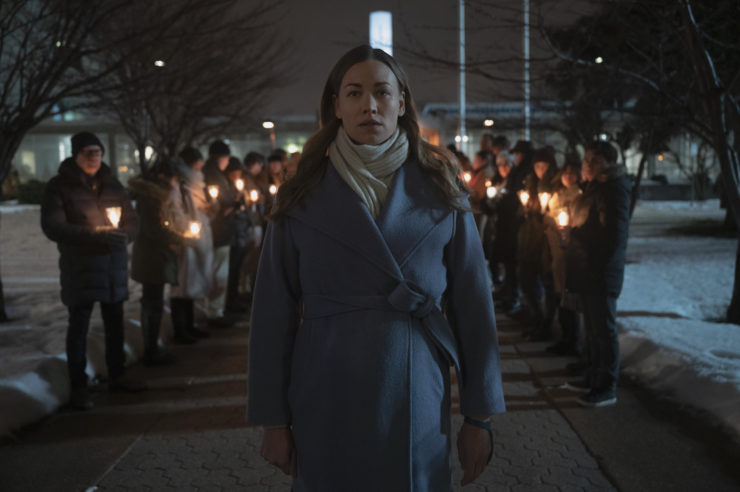
It’s super creepy to see the crowd of supporters for Serena in Canada. Though we don’t know much about them yet aside from their warm sympathy for her, I want to understand how they could think that Gilead is on the right side of history. Regardless, she’s found her flock, and has gotten just enough encouragement to try and reach more internationally.
Serena’s plot to televise Fred’s funeral is the kind of media savvy that’s most fascinating about her character, though it feels a bit like a retread of 3×05 “Unknown Caller,” when the Waterfords forced June/Offred to participate in their televised message mourning the kidnapping of Nichole. But you have to give Serena points for creating a throughline for the media: the Waterfords and their many personal tragedies, meant to show the human beings behind Gilead’s borders, and now she’s the last one standing.
And who’s that, in the flock of girls brought out to witness the brave Wife (Widow?) standing over her Commander’s coffin? Why, it’s little Agnes.
Serena vs. June
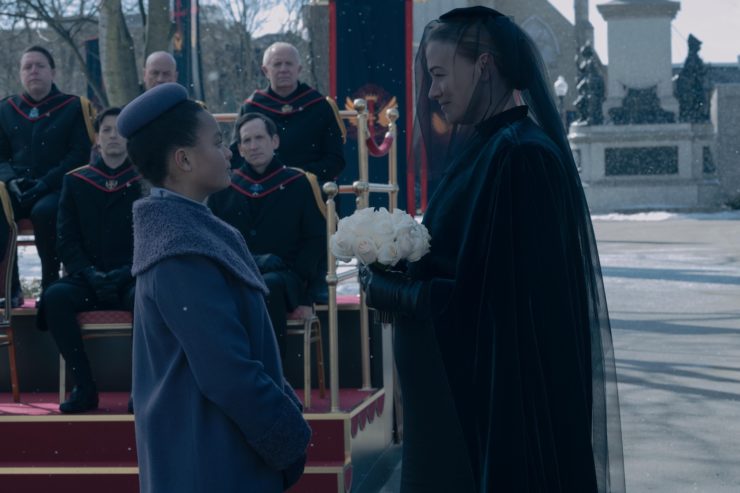
Was I the only one who initially thought that June sent Serena Fred’s finger as a sort of olive branch? Like, hey, I remember when he did this awful thing to you, and now he can’t hurt you anymore? But Serena takes it only as a taunt, possibly even as a threat: You’re next. But instead of going after June’s finger, she goes after her heart.
Watching their constant push and pull with Hannah/Agnes at the center, I can’t help but think of the Biblical parable about the judgment of King Solomon, specifically his pronouncement of what constitutes true motherhood. In short, two mothers come to petition him after one of their sons was smothered in his sleep. Each woman claims the living baby as her own, so Solomon suggests someone bring him a sword and he cut the baby in half. While one woman basically says, “Sure—if I can’t have him, then no one can,” the other begs Solomon not to, saying that she would rather the baby go to the other woman if it will mean he lives. That woman, the wise king decides, is the true mother.
You would think that once Serena gives birth to her son, she would be horrified at her behavior in constantly dangling June’s daughter in front of her: that first time she visited her outside the school while Offred was locked in the car screaming herself raw, unheard; and now, arranging for the young Gileadean girl to bring her flowers and cradling her head on international television. A true mother would never do that, right?
Yet we can’t forget that Serena has also embodied the true mother, according to Solomon’s definition, by being willing to give up Nichole in the end of season 2: when she had the chance to stop Offred from fleeing, but was so shaken (by her recent pinky amputation) at the thought of what growing up in Gilead would actually be like for her daughter. In that moment, Serena chose what was best for the baby over her own selfishness and spite.
But that was a baby who, at least for a little while, Serena and June oddly coparented. Serena has no similar compunction toward Agnes; she may even resent her for being conceived out of love in a pre-Gilead world. Agnes, she’s willing to sacrifice to make a point. Hannah, June can never give up to Gilead. She can’t regard her child the way that Sylvia talks about her lost spouse; the time they had together wasn’t enough to make up for the time apart. And that’s why June can’t move on until she’s exhausted every possibility for saving her daughter from this world—whether it means smuggling her out (with the potential that Agnes would run back to Gilead’s skirts, now that she’s so used to that world) or blowing it up entirely.
Still, I hope the writers have come up with a fresh way to explore June returning to Gilead yet again. Or that at least it will better contrast with Serena’s uncomfortable return and unclear fate. In that final showdown, Serena’s expression—imposing, staring down her nose almost regally, but with that shit-eating smirk—is so much more interesting than Elisabeth Moss’ same old angry!June face.
Box of Chocolates
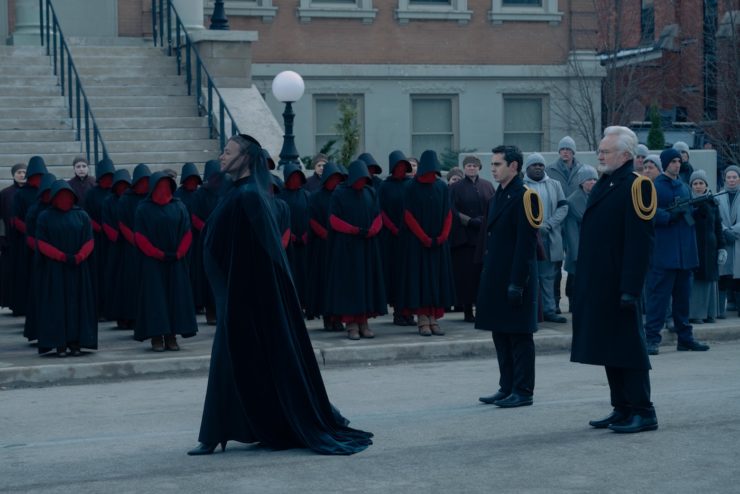
- I really hope we don’t have to listen to The Everly Brothers’ “All I Have to Do is Dream” every time June is fantasizing about getting her revenge on Serena.
- Looking forward to seeing more about Nick’s (Max Minghella) new Wife Rose (Carey Cox), who seems unusual among other Wives for having a disability. She also speaks to him with much more familiarity than we’ve seen; she seemingly knows about his relationship with June, though it’s very telling that she says, “Maybe June can find some peace now” as if her husband isn’t dying to cross the border himself.
- How did Esther poison those chocolates? I’d say she went the Yellowjackets route, except where would she have gotten access to both the toxin as well as the syringes to inject each and every truffle?
- Luke’s face on “I sent her a finger” better nab O-T Fagbenle another Emmy nod.
- Definitely thought June was getting dressed up in white for a vow renewal with Luke—I mean, they probably have some marriage license shit to untangle—but no, she was headed for the ballet. Or really, it was about contrasting her with Serena’s black funeral garb; it’s not even about Luke, it all comes back to Serena.
- In addition to the final season, we’ve also got the spinoff adaptation of Margaret Atwood’s The Testaments to look forward to. I’ll be keeping that novel’s plot points in mind as I review the rest of this season, as it should give us the time jump I still want.
What do you think will be in store for The Handmaid’s Tale season 5?
Natalie Zutter is definitely working through a lot of feelings watching this series for the first time since becoming a mother. Talk The Handmaid’s Tale and The Testaments with her on Twitter!










